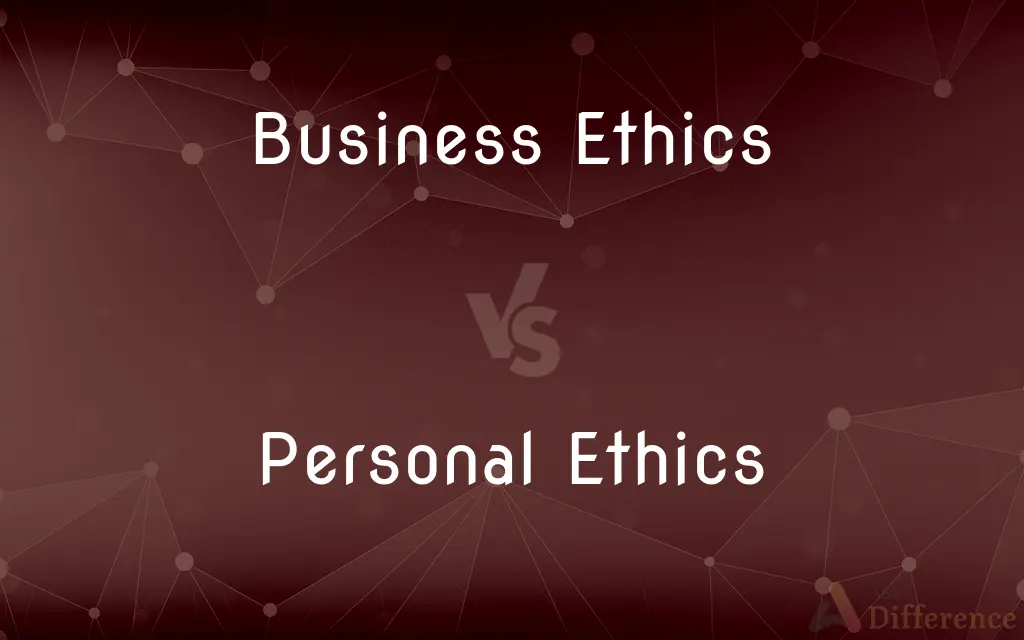Business Ethics vs. Personal Ethics — What's the Difference?
By Tayyaba Rehman — Published on December 20, 2023
Business ethics guide organizational decisions and conduct, while personal ethics guide individual beliefs and actions.

Difference Between Business Ethics and Personal Ethics
Table of Contents
ADVERTISEMENT
Key Differences
Business Ethics and Personal Ethics represent two distinct sets of values that guide behavior. Business ethics pertain to the moral standards that shape a company's decisions, while personal ethics refer to an individual's own moral compass guiding their decisions and actions.
Business Ethics and Personal Ethics, while different, can sometimes overlap. A company might adopt business ethics that reflect the personal ethics of its leadership. Conversely, an individual might be influenced by their workplace's ethical culture in shaping their personal ethics.
Business Ethics often revolve around issues like fairness, transparency, and accountability in the professional realm. On the other hand, Personal Ethics might address broader life questions, such as one's stance on honesty, loyalty, or kindness.
Business Ethics are critical for building trust with stakeholders, including customers, employees, and investors. In contrast, Personal Ethics play a crucial role in individual character development and interpersonal relationships.
At times, individuals might find a conflict between Business Ethics and Personal Ethics. For instance, a company's business practices might clash with an employee's personal ethical beliefs, leading to moral dilemmas.
ADVERTISEMENT
Comparison Chart
Scope
Pertains to organizational decisions and actions.
Relates to individual beliefs and behaviors.
Influences
Stakeholders, laws, industry standards.
Personal experiences, upbringing, culture, religion.
Purpose
Building trust, ensuring legal compliance.
Guiding individual life choices, character development
Potential Conflicts
Profit vs. ethical practices.
Workplace demands vs. personal beliefs.
Evolution Over Time
Can change with leadership or industry standards.
Can evolve with personal experiences and growth.
Compare with Definitions
Business Ethics
Standards that promote trust and integrity within a business.
Adhering to business ethics, the company addressed the product recall promptly.
Personal Ethics
Moral standards derived from personal experiences and upbringing.
Influenced by his upbringing, his personal ethics emphasize generosity.
Business Ethics
The moral principles guiding business practices and decisions.
Companies with strong business ethics tend to have a loyal customer base.
Personal Ethics
The principles guiding one's decisions and actions.
Due to her personal ethics, she always returned found money.
Business Ethics
A set of guidelines that dictate how an organization operates.
Due to its business ethics, the firm refused to engage in deceptive advertising.
Personal Ethics
A reflection of character and integrity in personal behavior.
Her personal ethics are evident in her consistent kindness.
Business Ethics
Principles that prioritize ethical considerations over mere profit.
Their commitment to business ethics means they source materials sustainably.
Personal Ethics
Standards one sets for themselves based on their beliefs.
His personal ethics dictate always helping someone in need.
Business Ethics
Organizational values that ensure fairness and transparency.
Business ethics demand that the company disclose all financial irregularities.
Personal Ethics
An individual's moral beliefs and values.
His personal ethics wouldn't allow him to lie, even for personal gain.
Common Curiosities
Can Business Ethics influence Personal Ethics?
Yes, the ethical culture of a workplace can influence an individual's personal ethical beliefs.
What are Business Ethics?
Business ethics are moral guidelines that shape a company's decisions and actions.
How do Personal Ethics differ from Business Ethics?
Personal ethics guide individual beliefs and behaviors, while business ethics guide organizational conduct.
What factors influence the development of Personal Ethics?
Personal experiences, upbringing, culture, and religion can shape personal ethics.
Who defines a company's Business Ethics?
Business ethics can be defined by leadership, influenced by industry standards, and sometimes shaped by stakeholders.
Is it essential for one's Personal Ethics to align with their workplace's Business Ethics?
While it's not mandatory, alignment can lead to job satisfaction and reduced moral dilemmas.
Can Personal Ethics evolve over time?
Yes, personal ethics can change based on personal experiences, growth, and life situations.
Why are Business Ethics important?
Business ethics build trust with stakeholders and ensure compliance with laws and regulations.
Can a company have both good and bad Business Ethics?
Yes, a company might uphold certain ethical standards while neglecting others.
Is it possible for everyone to have the same Personal Ethics?
No, personal ethics are deeply individual and can vary widely among different people.
What happens when Personal Ethics clash with Business Ethics?
It can lead to moral dilemmas, job dissatisfaction, or even decisions to leave or change the workplace.
How can companies ensure they uphold good Business Ethics?
Regular training, a clear code of conduct, stakeholder feedback, and ethical leadership can promote good business ethics.
Can Business Ethics change?
Yes, business ethics can evolve based on changes in leadership, industry norms, or societal values.
Are laws and regulations the same as Business Ethics?
No, while laws set minimum standards, business ethics often go beyond legal requirements to encompass broader moral principles.
Why should individuals prioritize Personal Ethics?
Personal ethics guide life choices, foster personal growth, and impact interpersonal relationships.
Share Your Discovery

Previous Comparison
Input Device vs. Output Device
Next Comparison
Checkmate in chess vs. Stalemate in chessAuthor Spotlight
Written by
Tayyaba RehmanTayyaba Rehman is a distinguished writer, currently serving as a primary contributor to askdifference.com. As a researcher in semantics and etymology, Tayyaba's passion for the complexity of languages and their distinctions has found a perfect home on the platform. Tayyaba delves into the intricacies of language, distinguishing between commonly confused words and phrases, thereby providing clarity for readers worldwide.












































